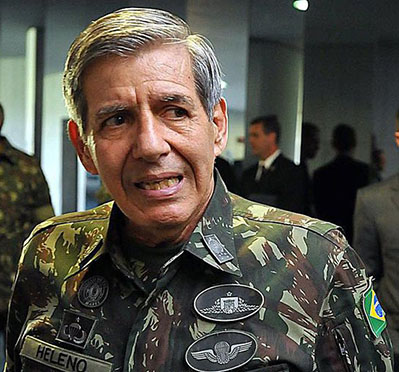BRASILIA, (Reuters) – Brazil’s National Security Adviser Augusto Heleno said yesterday that right-wing President Jair Bolsonaro had not offered to host a U.S. military base or American soldiers on Brazilian soil.
Bolsonaro said during a TV interview last week that he was open to the possibility of hosting a U.S. base to counter Russian influence in Venezuela, while his Foreign Minister, Ernesto Araujo, said last week that Bolsonaro was planning to discuss a U.S. military presence with U.S. President Donald Trump during an expected visit in March.
“He told me he never said that. It was a comment he made when talking about the Russian base (in Venezuela) and then suddenly this came out that it was an American base,” Heleno told reporters after a cabinet meeting.
The seemingly contradictory messages and apparent backsliding over the possible U.S. base highlight the fragility of Bolsonaro’s cabinet, which is comprised of statist former generals, right-wing nationalists, Chicago-trained economists and Christian conservatives, all of whom with different priorities.
The plan to offer to host a base appears to have been dropped due to opposition from the armed forces, who see a foreign presence as a transgression of national sovereignty. A senior army officer told Reuters on Saturday that the Brazilian military was against the idea.
The Folha de S.Paulo newspaper on Tuesday reported that Bolsonaro had backtracked on the idea, and that Defense Minister Fernando Azevedo had informed military commanders of the president’s decision. The story cited unnamed generals who received the message.
Even the defense minister said he sees no reason to allow the United States to set up a military base in the country.
“This needs to be carefully evaluated. I don’t see what the reason is for such a base,” Azevedo, a retired army general picked by Bolsonaro, told the financial newspaper Valor Economico.
Bolsonaro, who took office on Jan. 1, said in a television interview he might be willing to allow a U.S. base in Brazil as a way to counter Russian presence in Venezuela, one of the most significant U.S. foes in Latin America.
Bolsonaro, an admirer of Trump, has quickly moved to align Brazil more closely with the U.S. government, which was represented by Secretary of State Mike Pompeo at his swearing in last week.
Pompeo told reporters on Wednesday that the United States and Brazil had “an opportunity to work alongside each other against authoritarian regimes” in the region, naming Venezuela, Cuba and Nicaragua.

